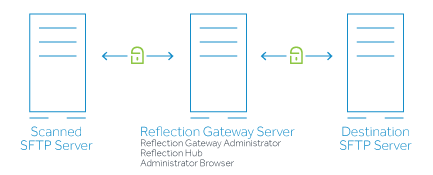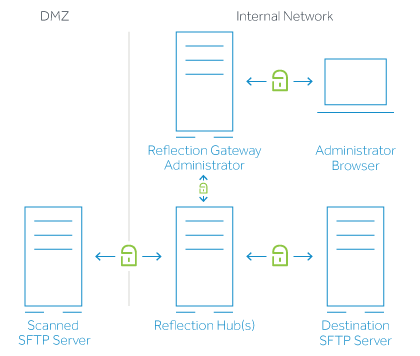 previous
previous
 next
next
Jobs enable you to automate the secure transfer and handling of files. Reflection Gateway scans for new and updated files in specified directories located on any added SFTP server.
The main components for Job actions are:
Reflection Gateway Administrator
The Reflection Gateway Administrator service is the central management service for Reflection Gateway. It interacts with other Reflection Gateway components and provides a web user interface. For Job setup, you will use it to manage user and groups access, add connection information for your SFTP servers, add connection information for and the server(s) running the Reflection Hub service, configure scan intervals and filters, and set up Job actions. Configuration data is stored on a database. You can use the default database, which runs on the same server, or configure Gateway Administrator to use an alternate database.
Reflection Hub
The Reflection Hub service makes connections to SFTP servers and executes the Job actions you have defined using Gateway Administrator. You can configure multiple Hubs to help ensure high availability and rapid response. Each Hub communicates with Gateway Administrator securely using HTTPS. Certificate authentication for these connections is configured when you add the Hub to Gateway Administrator. Hubs communicate with SFTP servers using secure SFTP connections. Authentication for these connections is configured when you add the SFTP server to Gateway Administrator.
SFTP servers
You can configure Reflection Gateway to scan files on any SFTP server you have added using Gateway Administrator. You can transfer files to and from the scanned server, and any other added SFTP server. You can also manage your files by executing commands on any added server.
NOTE:The diagrams in this section show only the components required for Jobs. If you are setting up for both Jobs and Transfer Sites, review Reflection for Secure IT Gateway Components to see how to include Transfer Site components in your planning.
You can install all Reflection Gateway services on a single server or use a distributed configuration.
For example, the configuration shown below installs the Reflection Gateway Administrator and Reflection Hub services on a single system. The administrator can launch the Gateway Administrator web application directly from this system. This sample configuration uses two SFTP servers. One server is scanned for new or updated files. Job actions can be configured to act on the arriving files and transfer them to the second SFTP server. A configuration like this can be helpful for initial testing even if your final plans involve a more complex configuration.

An example of a more distributed configuration is shown below.
